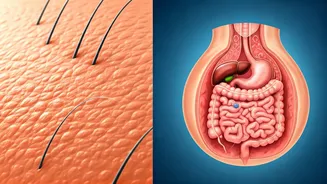Skin's Gut Connection
The gut, often referred to as the second brain, plays a pivotal role in overall health. It houses trillions of bacteria, viruses, and fungi, collectively
known as the gut microbiome. This intricate ecosystem influences everything from digestion and nutrient absorption to immunity and mental health. When the gut microbiome is in balance, it supports optimal function and overall well-being. However, imbalances, such as dysbiosis, can lead to various health issues. One of the ways imbalances often manifest is through the skin. The skin, as the largest organ, acts as a barrier and a reflector of internal health. Consequently, skin conditions can be indicators of underlying gut problems. Recognizing these signs is crucial for early intervention and restoring balance within the gut-skin axis.
Dark Circles and Puffiness
The appearance of dark circles and puffiness around the eyes can sometimes be a subtle yet telling sign of gut imbalance. These issues often arise due to inflammation and poor nutrient absorption. When the gut is compromised, it may struggle to efficiently absorb essential nutrients needed for overall health, which impacts the skin’s appearance. Inflammation, a common consequence of gut dysbiosis, can also contribute to fluid retention and the dilation of blood vessels around the eyes, leading to dark circles and puffiness. Furthermore, the liver, which plays a critical role in detoxification, can become overburdened by toxins if the gut is not functioning optimally. This overload can then manifest through the skin, emphasizing the need for gut health. Consider improving your diet, incorporating probiotics, and other methods to heal the gut.
Redness and Inflammation
Skin redness and inflammation can frequently signal an unhealthy gut. Chronic inflammation in the gut, stemming from factors like food sensitivities or an imbalance in gut bacteria, can trigger inflammatory responses throughout the body, affecting the skin. This systemic inflammation manifests as redness, irritation, and conditions such as eczema, psoriasis, or rosacea. The gut lining, if compromised, can become 'leaky,' allowing undigested food particles and toxins to enter the bloodstream. The immune system then reacts, causing inflammation and skin issues. Managing gut health through diet, stress reduction, and possibly probiotics can significantly alleviate redness and other inflammatory skin conditions. Addressing the underlying gut inflammation is key to restoring skin health and reducing irritation.
Dryness and Flakiness
Dry, flaky skin can also be a direct result of an unhealthy gut. This happens because the gut is responsible for the absorption of vital nutrients like fatty acids, vitamins, and minerals that are essential for maintaining skin hydration and elasticity. An impaired gut may not be able to effectively absorb these nutrients, leading to a deficiency that causes dry, flaky skin. Furthermore, gut imbalances can disrupt the skin's barrier function, which is critical for retaining moisture. When the gut health is restored, the body's ability to absorb nutrients improves, leading to healthier skin. Ensure your diet includes healthy fats and sufficient hydration. This approach contributes to improved skin hydration and a reduction in flakiness.
Acne on the Jawline
Acne, particularly around the chin and jawline, often has a strong correlation with gut health. Hormonal imbalances, which can be influenced by gut health, are a primary driver of acne in these areas. The gut microbiome impacts hormone regulation. Imbalances can affect the body's ability to process and eliminate hormones efficiently, leading to acne. For example, excess androgens can lead to increased sebum production, contributing to breakouts. Improving gut health through a balanced diet, including probiotics and prebiotics, can help to regulate hormones and reduce acne flare-ups. Addressing this connection between the gut and hormonal balance is a crucial step in maintaining clear and healthy skin.
Fatigued and Dull Skin
Skin that appears fatigued and dull can indicate that there is an underlying problem with gut health. The gut's efficiency in absorbing nutrients is critical for providing the necessary elements for cellular energy and function. If the gut is imbalanced, it cannot absorb all of the essential nutrients that the body needs. This can lead to a general lack of energy and vitality, which is reflected in the skin as a dull appearance. Poor gut health can also disrupt sleep and increase stress levels, which further diminish skin radiance. Additionally, toxins that are not adequately processed by the gut and the liver can build up in the body and contribute to skin issues. Addressing gut health by supporting a balanced gut microbiome supports the efficient absorption of nutrients and reduces skin dullness.



















